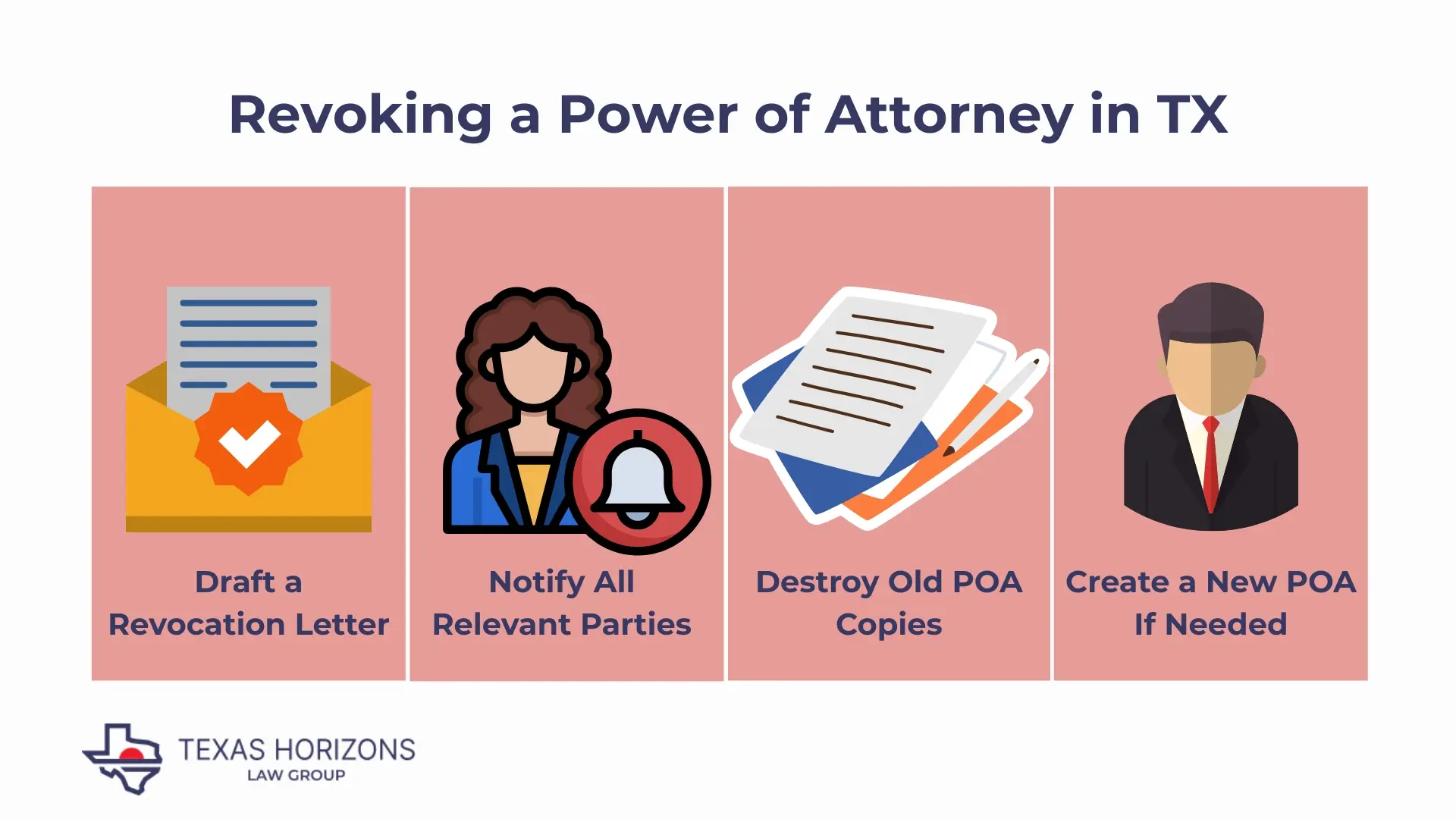A power of attorney (POA) is a valuable tool in Texas estate planning, appointing someone you trust to manage your affairs when you’re unable. But what happens when that relationship changes? Fortunately, Texas law gives you the right to revoke a POA at any time — provided you’re mentally competent.
In this guide, we’ll explain when and how to revoke a power of attorney in Texas, step by step.
What Is a Power of Attorney?
A power of attorney is a legal document that gives someone else (known as an “agent” or “attorney in fact”) the legal authority to act on your behalf. In Texas, POAs are frequently used in estate planning to ensure continuity of financial or medical decisions if the principal (that’s you) becomes ill, disabled, or otherwise unable to manage their own affairs.
There are several types of power of attorney under Texas law, including:
- General POA: Grants broad authority over your finances and legal affairs; it becomes invalid if you become incapacitated unless stated otherwise.
- Limited POA: Applies only to a specific set of tasks or specific properties, such as signing a deed while you’re out of town.
- Durable POA: Stays in effect even if you become mentally incapacitated; this is the most common type used in estate planning.
- Medical POA: Allows your agent to make healthcare decisions if you’re unable to do so.
- Springing POA: Becomes active only when a specific triggering event occurs, such as your physician certifying that you’re incapacitated.
The authority you grant to your agent can be extensive or limited, and it can be temporary or ongoing. This flexibility makes powers of attorney very useful, but it also demands careful oversight.

Your Right to Revoke a Power of Attorney in Texas
Texas law permits you to revoke a power of attorney at any time, for any reason, as long as you have the mental capacity to make that decision. Meaning, you don’t need to justify your decision or wait for approval. Whether your relationship with the agent has changed or you simply want someone else to step in, you have full authority to take action as you see fit.
POAs may also automatically terminate under certain conditions, such as:
- Your death
- The death or resignation of the agent (unless alternates are named)
- A court invalidating the document
- Divorce if the agent is your former spouse
In most scenarios, however, revocation is up to you — and you’ll want to make sure it’s done correctly.
Steps to Revoke a Power of Attorney in Texas
Revoking a power of attorney is a legal process, but it doesn’t have to be complicated. The key is to complete each step properly to ensure that the change is legally valid and all involved parties respect it.

Step 1: Write and Sign a Revocation Letter
Start by drafting a formal revocation letter that includes:
- Your name and contact information
- The name of the agent you’re removing
- The date the original POA was signed
- A clear, direct statement that you’re revoking the agent’s authority
This letter should be signed in the presence of a notary public. Notarization isn’t strictly required by Texas law for all revocations, but it will greatly strengthen the validity of your document, especially when dealing with banks, title companies, or healthcare providers.
If your original POA was recorded with the county clerk (this is common in real estate transactions), you’ll need to record the revocation as well.
Step 2: Deliver Copies to All Relevant Parties
Your job isn’t done after you write the revocation — you must also notify everyone who relied on the original POA. First and foremost, you need to notify the agent immediately.
Along with the agent, you may need to send a copy of the revocation letter to:
- Various financial institutions (banks, credit unions, investment firms, etc.)
- Medical providers (if a medical POA is being revoked)
- Title companies, real estate professionals, and landlords
- Tax authorities and government agencies
- Any other third parties who may have interacted with your agent
To create a comprehensive paper trail, use certified mail with return receipt or deliver documents in person and obtain written confirmation.
Step 3: Destroy Old Copies of the POA
If you have physical or digital copies of the original document, destroy them to avoid confusion. While this step alone won’t legally revoke the document (especially if your agent still has a copy), it will help reduce the risk of someone mistakenly relying on an outdated form.
Additionally, if the POA you are revoking is recording in the official public records of a county, it would be wise to also record your revocation with the same office of official public records.
Step 4: Consider Executing a New Power of Attorney
If you still need someone to act on your behalf, you can prepare a new POA. Make sure it includes language that clearly revokes all prior powers of attorney.
This is the most straightforward way to streamline your estate plan and eliminate outdated or overlapping authority. A new POA automatically replaces the old one, but proper notice must be given to all relevant parties.
Who Can Override a Power of Attorney in Texas?
While the principal always has the primary authority to revoke their power of attorney, there are scenarios where others may intervene to override it.
The Principal
As long as they’re at least 18 years old and mentally competent, the principal can revoke or override the POA at any time by signing a revocation letter and creating a new POA.
A Court-Appointed Guardian
If the principal becomes incapacitated, a Texas court can appoint a guardian. This typically overrides the POA, shifting decision-making authority to the guardian.
Family and Other Parties
If someone believes the agent is abusing their power or acting against the principal’s best interests, they can file a court petition to challenge or revoke the POA.
When Should You Consider Revoking a Power of Attorney?

There’s no need to wait for a crisis to revoke a power of attorney. Here are some common reasons Texans choose to revoke or update these documents:
Loss of Trust
If your agent has become unreliable, secretive, or uncooperative — or you simply no longer feel comfortable with them handling your affairs — you may wish to revoke the POA.
Agent Misconduct or Abuse
Unfortunately, there are situations where agents misuse their authority for personal gain. If there are signs of financial abuse, such as questionable transactions or missing assets, swift revocation is critical.
Major Life Changes
Marriage, divorce, out-of-state moves, changes in family relationships, or the death of someone involved in your estate plan may prompt you to revise your POA arrangements.
Agent Unavailability
Your agent may become incapacitated, move far away, or simply decline to continue serving. In these cases, you’d want to revoke the existing POA and designate a replacement.
New Appointment
Maybe your financial and healthcare needs have evolved, or perhaps a more trusted family member has become available. Either way, it’s wise to keep your POA updated and aligned with your current desires and circumstances.
Can You Simply Update a POA Instead of Revoking It?

If your core wishes remain the same but you want to change certain details (such as naming a new agent, adjusting their authority, or adding/removing co-agents), a formal update might be enough. This must be enacted via a signed, dated amendment.
However, if the changes are substantial or could create confusion, drafting a new POA is often the better solution. A lawyer can help you decide which approach is best.
What If the Agent Misuses Their Authority or Refuses to Step Down?
In rare cases, an agent might take actions that raise serious concerns or continue acting even after they’ve had their authority revoked. When this happens, it’s time to explore legal remedies.
Any of the following actions or circumstances could indicate a misuse of POA authority:
- Unauthorized withdrawals or financial transactions
- Refusal to provide documentation or financial records
- Isolation of the principal from family members
- Conflicts of interest or personal enrichment by the agent
If you suspect abuse or the agent refuses to stop acting, here’s how you can respond:
- File a petition with the probate court
- Request that the court invalidate the POA
- Ask for a guardian to be appointed in cases of incapacity
The court will request evidence, such as financial statements or witness testimony, to determine whether the agent has violated their legal responsibilities.
Keep in mind that agents have a fiduciary duty to act in your best interests. Breaching this duty is grounds for legal action and can result in civil penalties.
Protecting Yourself from Potential POA Abuse
Prevention is always more effective than reactive litigation. When creating or updating your power of attorney, consider implementing the following safeguards:
- Choose someone you trust implicitly
- Clearly define what powers the agent does and doesn’t have
- Limit the scope of the POA to specific tasks or timeframes
- Require the agent to provide periodic financial reports
- Regularly review and update your documents
You can also talk with your estate planning attorney about combining POAs with living trusts, advance directives, and other tools that give you more control over your assets and medical care.


